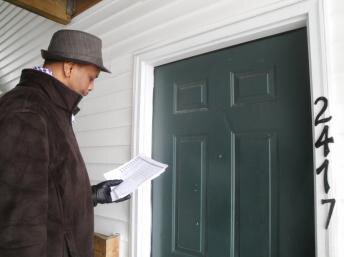Ohio’s Somali voters have swing-state power
 A week before election day in the United States, all eyes are on swing states and on Ohio in particular. The state is split between Democrats and Republicans but also has many undecided voters. The state capital, Columbus, is home to the country’s second-largest Somali community, mostly refugees.
A week before election day in the United States, all eyes are on swing states and on Ohio in particular. The state is split between Democrats and Republicans but also has many undecided voters. The state capital, Columbus, is home to the country’s second-largest Somali community, mostly refugees.
Sarah, a young woman wearing a black headscarf with rhinestones is one of them. Until she cast an early ballot on Monday, she was not sure whom she would vote for.
“I was undecided, between Obama, the Democrat, versus the Republicans,” she explains. “I voted Republican the first time that I voted but this time I voted the Democrat.”
That first time was in 2008, the first time she ever voted in the United States. She says she voted for Republican John McCain for president then because she did not agree with Obama and the Democrats’ stance on gay marriage.
But this time she does not like Republican candidate Mitt Romney. She is particularly angry about his comments in a secretly recorded fundraising speech where he dismissed the 47 per cent of Americans who pay no federal income tax, saying they are dependent on the government.
That upset Sarah so much that that she has persuaded her friends and co-workers to vote against Romney. She came to the early voting centre with five other women – friends and neighbours – and vows to bring more later.
Two thousand people have been showing up at the early voting centre in Columbus each day since it opened on 2 October. People are casting absentee ballots in person.
Among the voters are many Somalis. Only Minneapolis has a larger Somali population than Columbus’s 55,000.
Mussa Farah, the president of the Columbus-based Horn of Africa Rescue Committee, says most, like him, came to the US after the civil war in their country of origin.
“We came here as refugees, and a good number became US citizens,” he says. He estimates between 18,000 and 20,000 Somalis have become citizens, which makes them eligible to vote.
“I don’t know whether all of them vote,” he adds. “But a good number of us vote.”
During elections his group helps people register to vote and get to the polls. He says there is motivation in the community.
“We come from a country where democracy was not practised, so we are very excited in this process,” he says. “We educate people on how one vote can make a difference.”
This is particularly true in Ohio, where the election will be decided on a very slim margin.
For several weeks members of Farah’s group have been spending time in Somali neighbourhoods, like the Providence Glen housing development, encouraging people to register to vote.
Now, a week before election day, they are encouraging people to go vote early to avoid lines on 6 November.
Abdul, a tall man wearing a fedora and leather gloves against the cold and wind, knocks on doors, looking for people on a list of registered voters provided by the board of elections.
People open their doors cautiously, though once they hear him speak thier language, they open them further.
Several people promise him they will go to vote later. One elderly woman is in the verge of accepting his offer to drive her to the early voting centre but her son insists it is too cold.
Another woman was convinced she had voted when she registered.
“I told her that’s not a vote; you have to go in person to vote,” Abdul says after a prolonged conversation in Arabic. “Now she understands and she said she’ll go vote.”
Back at the early voting centre, 25-year-old Amaal and her mother have just voted. Her mother smiles broadly. Speaking in a combination of English and Arabic, she says this is her first time voting.
“I’m happy because I’m American, I have choice,” she says.
Amaal says she and her mother had been leaning towards voting for Obama but they had watched the debate to make sure, “to hear the other side”.
And the debate divided the family.
“We are voting for Obama,” says Amaal but her brothers are voting Romney.
It’s this division, in the Somali community and all over Ohio, that explains why this state has become the most closely watched in this election. So far Obama has kept his narrow lead, but with a week to go before election day, anything can happen.
__
RFI
Comments
comments
 Calendar
Calendar





































